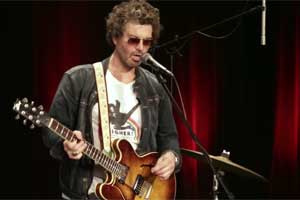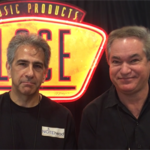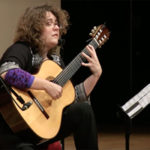Recounting the days with Eric Clapton, world travels and his first new album in 15 years
By Gary Graff
February 10, 2017
You’d be hard-pressed to find a more decorated journeyman than Doyle Bramhall II. Raised in the musical hotbeds of Texas and northern California, he has music in his DNA courtesy of his late father, a legendary drummer to the stars, and was childhood friends with Stevie Ray and Jimmie Vaughan, even playing in the latter’s Fabulous Thunderbirds before forming Arc Angels in the wake of the former’s 1990 death. Bramhall’s resume also includes a long tenure in Eric Clapton’s band as well as working with B.B. King, Roger Waters, Elton John, Gregg Allman, Dr. John, Meshell Ndegeocello, Gary Clark Jr., the Tedeschi Trucks Band, Sheryl Crow and others. Bramhall has released his own albums as well — though his latest, 2016’s Rich Man was his first in 15 years. He was hardly idle during the interim, however, and that work served him well, not only on the album but also in re-invigorating Bramhall moving forward.
FGPO: Why 15 years between albums? Too much demand from others?
Bramhall: It’s mainly because I started raising a family. I had two daughters, and I think it just sort of coincided with me not knowing what to do with myself in the music industry. I didn’t really know how to fit in. So I just relished my time being a father, and working with Eric.
FGPO: Being in Eric’s band is a pretty good excuse. What was that like?
Bramhall: It was all pretty surreal, I have to say. He is one of the most respected artists ever, really, in rock ‘n’ roll, and to get to tour with him on that level and play music with somebody I had grown up listening to and trying to emulate, it was just incredible. I got to see the world, most parts of the world, touring with him and playing music. I didn’t really think about it as I was doing it; it was more looking back after I did it. I’d be more head-down in my job, making the music and creating.
FGPO: So how does one go about being the OTHER guitar player in Eric Clapton’s band — besides very carefully?
Bramhall: [laughs] From the very beginning when he called me, he liked my songwriting and wanted to cover some of my songs and loved everything that I did. He just made me feel like I was a worthy artist and he wanted to have, I guess, a bit of my style or a bit of my influence in what he was doing. He likes what I brought to his thing, so that made me feel like I was a peer and respected. We fit really well together ’cause I would always play a lot of the counterparts to what he played, and it would happen within seconds. So I think we just had fun ’cause we inspired each other, it seems.
FGPO: What did you learn about him that you couldn’t have known unless you played with the guy?
Bramhall: I guess just the simplicity of what he does and how effective that is was really impressive. That he’s a no-frills guy. He is what he is. He doesn’t use a lot of pedals and he doesn’t use a lot of stuff to get his sound. He plugs into an amp and turns up and plays like Eric Clapton. That cuts through a lot of the other stuff.
FGPO: You’re opening for Eric in London this spring, and he’s saying the shows there and in New York and Los Angeles will be his final performances. Do you buy it?
Bramhall: I don’t know. It could be. I don’t think he’ll tour again, but I don’t see how he can not play again, because he’s such a musical being in general that it seems like he would really need that in his life, no matter what.
FGPO: So what impact did that 15 years between albums, with Eric and everybody else, have on you when you started working on Rich Man?
Bramhall: I would say that a lot of who I am and how I am now, as a performer and a guitar player and my whole approach now, is due to playing with Eric every night and seeing how he works and the way he sort of took me in and made me feel like I was a great artist all the time. It sort of set me up to having a self-confidence and also just sort of believing in myself and knowing what my vision is as an artist now. It took many years for me to feel really comfortable in my own skin, and I think he definitely had a lot to do with that.
FGPO: You grew up with a first-call musician for a father. Did you ever want to be a drummer, too?
Bramhall: I played little drummer boy when I was in a play when I was six years old. He used to get me up after that, to play. I knew how to play a Texas shuffle back then, and I would sit on his kit and try to learn what he played. He was always very helpful; he nurtured it but he didn’t ever push me into anything. I think he thought [playing guitar] was the natural progression. It’s like a cobbler and his son. He was nurturing with everything, whatever I chose to do.
FGPO: One of Rich Man‘s nicest moments is “November,” which is a tribute to your father.
Bramhall: My father passed away in 2011 and it was definitely the heaviest thing that I’ve ever gone through in my life. [“November”] is kind of the conversation I never had with him about all the things I should’ve let go of while he was alive, and let him off the hook with certain things. I had my own hangups about our relationship, I think because I looked up to him so much and wanted to be just like him for so long. In order for me to get any of my own self, I had to make a little bit of a break and have some autonomy, and I think that sort of hurt him in a way. But I’d gotten through that and I wanted to tell him about it but didn’t get a chance to do it at the time, and he died. But now I feel like I can at least sing that conversation to him every night.
FGPO: There are a lot of exotic flavors and textures on Rich Man. How did those become part of your makeup?
Bramhall: When I was 15 years old I wanted to move away from the U.S. and go to Spain and France and study with the gypsies that were playing flamenco music. Shortly after that I started listening to an Egyptian singer named Umm Kulthum; she was one of the greatest if not the greatest singer in Arabic music of all time, and I really fell in love with Arabic melodies back then — and also by the instrument that accompanied her, the oud. I really fell in love with it. It had a melancholic kind of aspect to it that I also heard in Delta blues and old blues stuff. It hit me sort of the same way. I would say in the last eight years I really started studying it more and subsequently going to a lot of the places where that music was coming from, different parts of Africa and India and the Eastern block and wherever I could go. So I think just from traveling and listening to that music and studying that music can learning it, it creeps back into my own music in the same way it did with the Beatles.
FGPO: The key is the way you integrate it, though.
Bramhall: Sure, that’s right. The Beatles, they had a lot of that influence, and they actually did it in a way that made sense in the context of their music and didn’t sound like they were just saying: “I’m going to wear my Indian hat now and see what that sounds like.” It really worked in their music. I think between George Harrison’s knowledge and George Martin knowing the construction of all different types of classical music, not just Indian classical, they could really make it work together in what they did. So I think it’s just taking elements of that and putting it in and not trying to do that music specifically just sort of worked naturally.
FGPO: Do you find similarities at all in those Indian and African musics and in the blues and rock you grew up with?
Bramhall: Not really. They’re completely different things. Their instruments are much different. The technique is much different. The scales are quite a bit different. I learned to play oud, which is the Arabic/Turkish version of a lute, and that is a fretless instrument so it’s played more like a violin, but it has 11 strings on it. It’s an ancient instrument and a completely different instrument than the guitar, so it was an entirely different learning process.
FGPO: Given all the things you’ve done so far, where do you find your fans come from?
Bramhall: I’ve done so many different things I have fans coming from all directions. I definitely have a lot of fans who know me through Tedeschi Trucks and through Clapton and Roger Waters, as well as my solo career. I think it’s all just a big soup now.






